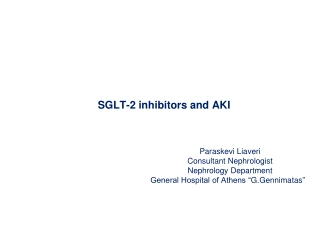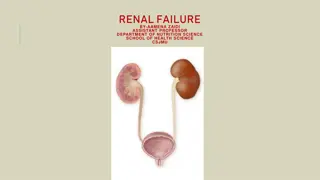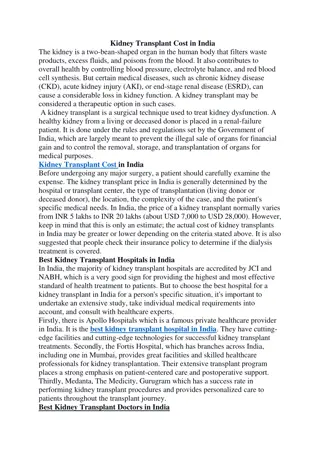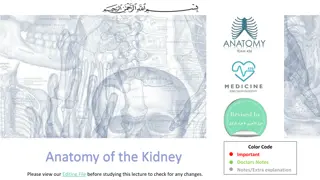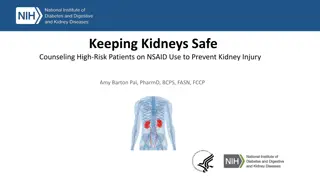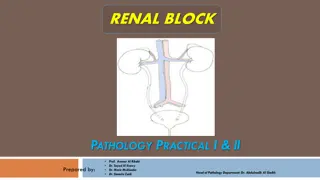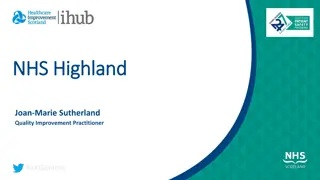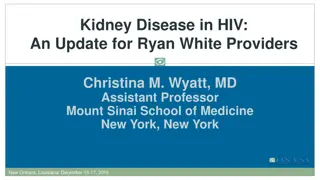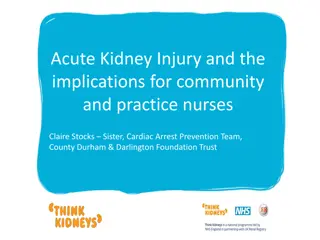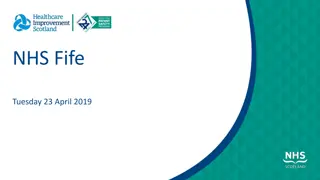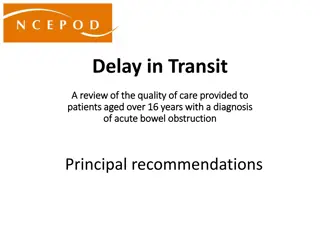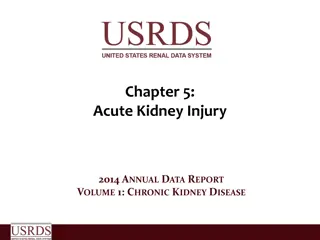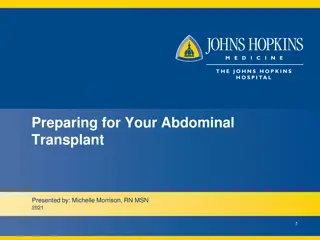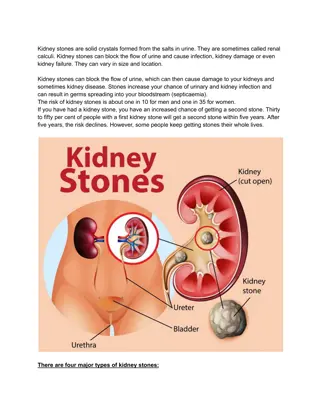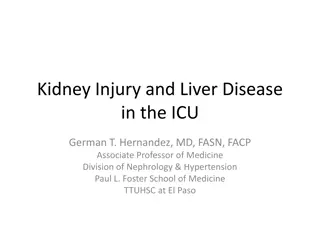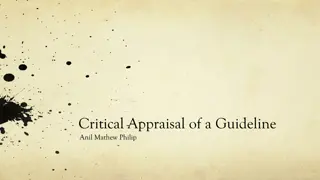Understanding Acute Kidney Injury (AKI) Criteria and Case Scenarios
Acute Kidney Injury (AKI) criteria according to KDIGO 2012 and AKIN 2008 definitions are discussed, emphasizing the importance of creatinine elevation and baseline values. Two case scenarios illustrate how to determine AKI based on creatinine levels and baseline values in patients. AKI diagnosis is crucial for appropriate management in clinical settings.
Download Presentation

Please find below an Image/Link to download the presentation.
The content on the website is provided AS IS for your information and personal use only. It may not be sold, licensed, or shared on other websites without obtaining consent from the author. Download presentation by click this link. If you encounter any issues during the download, it is possible that the publisher has removed the file from their server.
E N D
Presentation Transcript
ACUTE KIDNEY INJURY FOR CDI DeAnn Cummings, MD November 15, 2019
DEFINITION KDIGO 2012 (Kidney Disease Improving Global Outcomes) AKIN 2008 (Acute Kidney Injury Network) RIFLE Risk Stage 1 AKI - 1.5 x baseline Injury Stage 2 AKI - 2.0 x baseline Failure Stage 3 AKI - 3.0 x baseline
DEFINITION All definitions are similar. KDIGO is the most recent. Elevated creatinine by 0.3 within 48 hours or 50% or more elevation within 7 days ( known or presumed to have occurred within the prior 7 days ). Creatinine 1.5 x baseline or more Decreased urine output is also a criterion but not as well validated as a predictor of mortality and difficult to determine. We are not using it.
DEFINITION The term acute kidney injury has largely replaced the term acute renal failure . ARF has traditionally indicated a 3 x baseline rise in creatinine. However, morbidity and mortality both increase with smaller rises in creatinine.
Case #1 90 year old female presents with weakness and confusion. Her UA looks dirty and she is treated for a UTI with IV antibiotics. Labs Creatinine = 2.7 H+P states CKD stage 3 but no baseline is stated How do you decide if you should query for AKI?
Case #1 Points An increase in creatinine 1.5x baseline meets the definition of AKI Baseline can be obtained from previous labs up to a year ago. You note that 6 months ago, her creatinine was 1.8 (1.8 x 1.5 = 2.7) Therefore you would query for AKI, stating both baseline and present creatinine as well as the definition of AKI.
Case #1 Points What if her baseline creatinine was 2.4 and is now 2.7? This is not 1.5x baseline and is therefore not considered AKI. What if you cannot find a baseline but her creatinine goes from 2.7 to 1.5 during her hospital stay? You can use the lowest creatinine during hospital stay as baseline, and she would therefore meet criteria for AKI.
Case #2 70 year old male presents with severe sepsis due to UTI. He has been vomiting and his creatinine is elevated to 3.2. He initially had a couple blood pressures in the 80s but this improved with IV fluids. Two days later his sepsis has improved but his creatinine is still 2.8 (baseline is 1.0). He continues to receive IV fluids and the provider continues to state prerenal AKI in her notes. At what point do you query for acute tubular necrosis?
Case #2 Points Prerenal AKI not delivering enough blood/fluid to the kidneys Hypovolemia (dehydration, shock, sepsis, GI bleed) CHF not perfusing kidneys Cirrhosis not perfusing kidneys If this goes on long enough, there is damage and necrosis of renal tubules (ATN).
Case #2 Points When does prerenal AKI become ATN? Creatinine not back to baseline after 2-3 days of IV fluid, especially if: Episodes of hypotension Renal toxic drugs Severe sepsis Stated in nephrology note Casts on UA and elevated urinary sodium are not reliable. A fractional excretion of Na (FENa) of < 1% suggests prerenal while a FENa of > 2% suggests acute tubular necrosis.
Case #2 Points Consider escalating an ATN query if: The nephrologist states ATN in his note but the hospitalist continues to state AKI. If the creatinine has not significantly improved (close to or at baseline) after 3 days in the hospital, especially if a nephrologist is consulted.
AKI DENIALS 2 main reasons Creatinine improves within 2-3 days. The insurance company argues that this is prerenal but not AKI . However, prerenal AKI is a type of AKI! The insurance company states the creatinine must be 2 or 3 X baseline. This does NOT coincide with any of the definitions of stage 1 AKI. This is stage 2 or stage 3 AKI.
AKIN AKIN actually proposes a category of fluid responsive AKI and a category of fluid-unresponsive AKI It does NOT state that an elevated creatinine meeting criteria for AKI is not AKI if corrected by IV hydration or relief of post-renal obstruction.
AKI DENIALS What experience have people had fighting denials for AKI or ATN? Have you won external appeals?
ACUTE KIDNEY INJUERY DEFINITION OF AKI (KDIGO) 1. Increase in creatinine by 0.3 over 48-72 hours (must be prospective) OR 2. Increase in creatinine 1.5X baseline a. Baseline creatinine can be established from values up to one year previously. b. If no previous creatinine level, use lowest creatinine level during hospitalization as baseline. Specify cause of AKI prerenal, renal or postrenal Consider ACUTE TUBULAR NECROSIS if: 1. Creatinine does not return to baseline after 48-72 hours on IV fluid. 2. Patient has been hypotensive. 3. Patient has sepsis or severe sepsis. 4. Patient has been on vanco, aminoglycosides, synthetic cannabinoids or radiocontrast media.
INPATIENT OR OBSERVATION? INPATIENT OR OBSERVATION? Most patients with AKI due to dehydration will start out OBS. If creatinine is not improving with IV fluids or patient remains unable to take po, conversion to inpatient status is appropriate. Consider Inpatient status for: Increase in creatinine 3X baseline Creatinine over 4 with acute rise > 0.5 Anuria in a well-hydrated patient Severe encephalopathy Hemodynamic instability Severe electrolyte abnormality or acidosis New to dialysis Severe hypertension (> 180/120) Pulmonary edema with hypoxia For patients with CKD, consider Inpatient status for: Severe encephalopathy Recurrent seizures Unexplained syncope Severe or persistent uremic symptoms Persistent hypoxia Need for urgent dialysis in someone new to dialysis or with non-useable




